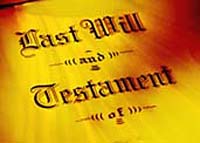 In some parts of the U.S., like West Virginia, without a will, your estate is first distributed according to your marital status and children, including those of previous marriages. However, if you have no spouse or children, you may want to pull out your family tree to see who could be in the running.
In some parts of the U.S., like West Virginia, without a will, your estate is first distributed according to your marital status and children, including those of previous marriages. However, if you have no spouse or children, you may want to pull out your family tree to see who could be in the running.
When there is no will in place, commonly in West Virginia, the current spouse of a married couple with or without one or more descendants receives the full estate. However, your spouse would receive only 60% of the estate if he or she had children with you and also a previous marriage. Your children would then receive the remaining 40% of the estate. But if you were the spouse with kids from a previous marriage(s), then all your children will inherit one-half of your estate, and the other half to your current spouse.
Confused yet? That’s what The (Huntington, WV) Herald-Dispatch asks us in its recent article titled “Planning ahead: What happens if you don't have a will.”
 Houston Estate Planning and Elder Law Attorney Blog
Houston Estate Planning and Elder Law Attorney Blog










